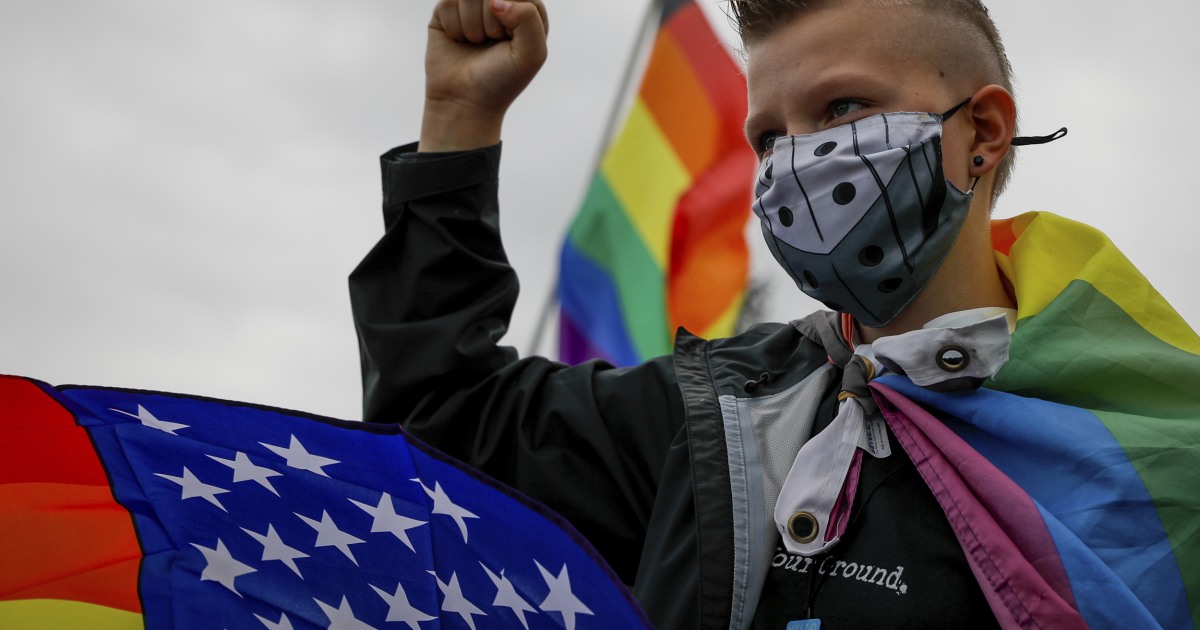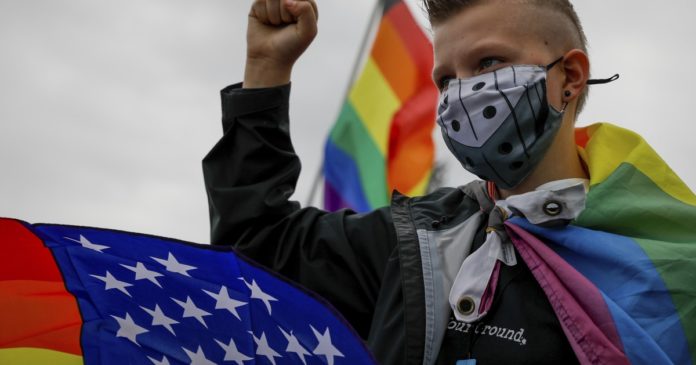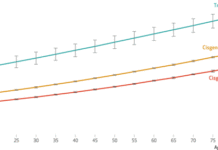
Pride flags, created to promote unity, are now being called political and divisive in some schools across America. In just one recent example, an Oregon school board on Tuesday banned educators from displaying the flags.
“We don’t pay our teachers to push their political views on our students. That’s not their place,” a school board member in Newberg and the policy’s author, Brian Shannon, said at a recorded board meeting.
Several other instances have occurred of school officials and students around the country targeting LGBTQ symbols. A Missouri teacher resigned last month after he was told to remove a rainbow flag from his classroom and that he couldn’t discuss “sexual preference” at school. Students at a high school near Jacksonville, Florida, were accused several weeks ago of harassing classmates in a Gay Straight Alliance club and stomping on Pride flags. And in August, Pride symbols were targeted at a high school near Dallas, where rainbow stickers were ordered to be scraped off of classroom doors.
In most of the cases where school officials are targeting the symbols themselves, administrators have defended their actions by saying that the LGBTQ emblems are divisive and “political.” But LGBTQ students, parents and teachers affected by the bans contend that the new rules are causing harm to a vulnerable group of young people.
“Feeling safe should not be political,” said Victor Frausto, 16, who is gay and a student at MacArthur High School in Irving, Texas, just outside Dallas. “For me, when a teacher put up that sticker, it basically conveyed the message that, ‘When you come in here, you will not be hated for who you love or what you identify as.’”
The decision by school officials to ban the rainbow Pride stickers sent a very different message, Frausto added.
“By seeing how those stickers were removed, you get the message that ‘I do not fit in here, I should not be here,’” he said.
Frausto, who is the president of his school’s Gay Straight Alliance (GSA), said that the rainbow stickers were removed overnight without warning.
When he and other GSA student members noticed, they brought it to the attention of their GSA sponsors, a group of teachers who had already received an email from the school district concerning the matter.
“While we appreciate the sentiment of reaching out to students who may not previously always had such support, we want to set a different tone this year,” read the email, which a teacher shared with NBC News.
The educators reassured the group that they would push for an explanation and fight to get the stickers back on classroom doors, Frausto said. But within the next several days, two teachers were escorted off campus, according to Frausto.
A spokesperson for the Irving School District declined to identify the teachers and, when asked about their alleged removals, told NBC News that the district “does not comment on employee-related matters.”
In response to the sticker removal, hundreds of students staged a class walkout last week. In a video posted Wednesday by the community-based journalism platform Smash Da Topic, students can be heard shouting, “Bring our stickers back!”
Following the protest, the district, in a statement, defended the move as a way “to ensure that all students feel safe regardless of background or identity” by maintaining political impartiality.
In Newberg, administrators also cited political neutrality in defending their policy. After fierce criticism for prohibiting Pride and Black Lives Matter flags specifically, school board members broadened a ban in September to block educators from displaying all symbols the board deemed “political, quasi-political or controversial.”
“Their place is to teach the approved curriculum, and that’s all this policy does is ensure that’s happening in our schools,” Shannon, one of the seven Newberg School District board members who spearheaded the policy, said at a livestreamed board meeting Tuesday night.
The Newberg City Council and the Newberg Education Association, a union representing 280 educators and staff in the District, have denounced the policy, and the Oregon State Board of Education has asked for it to be revoked. Newberg community members have also petitioned to recall Shannon.
“As a gay man with no children and no real desire to have children, I feel like I should never know the names of the people on the school board, let alone have to stand up against them,” said Zachary Goff, a Newberg resident who launched the petition, which has received over 1,000 signatures.
“I think I speak for a lot of people in my community, but we can’t sit here and let this happen,” Goff added. “They picked a really bad town to be the guinea pig.”
Chelsea Shotts, 29, who is bisexual and works at an elementary school as a behavioral interventionist within the Newberg School District, said her mental health has deteriorated since the district’s policy was introduced over the summer.
“If I only cared about myself, I would just quit — like easily quit and leave,” Shotts said. “But the thing is, I’m in Newberg and I’m in Dundee because I love these students and they deserve everything.”
“I would rather be able to stay here and keep doing the work instead of being attacked by a culture war that four board members started,” Shotts added.
School administrators are not the only ones who have gone after Pride flags and LGBTQ symbols this school year.
Police in Blacksburg, Virginia, are currently investigating several incidents of stolen Pride flags from outside a Virginia Tech religious center. In one case, the LGBTQ symbols were replaced with two Confederate flags. And in Georgia, a high schooler was charged last month for attacking another student draped in a Pride flag in a school cafeteria.
Advocates have long been warning educators of the disproportionate rates of bullying, harassment and mental health issues plaguing LGBTQ youth.
A 2021 survey by The Trevor Project, an LGBTQ youth suicide prevention and crisis intervention organization, found that 42 percent of the nearly 35,000 LGBTQ youth surveyed seriously considered suicide within the last year. More than half of transgender and nonbinary youth surveyed seriously considered suicide, it also found.
A separate survey conducted by The Trevor Project in 2020 found that LGBTQ youth who reported having at least one LGBTQ-affirming space reported lower rates of attempting suicide.
Beth Woolsy, who is bisexual and has two LGBTQ children who attend school in Newberg, said the harrowing numbers continue to weigh on her as she sends her kids back to school each day.
“When we understand that it’s truly life and death that we’re talking about as we send our kids to school, and then they’ve taken away the safety of knowing who they can go to and who they can expect to advocate for them, it is really scary,” she said.








